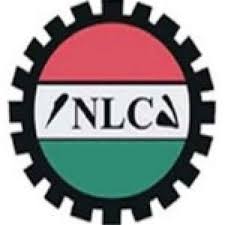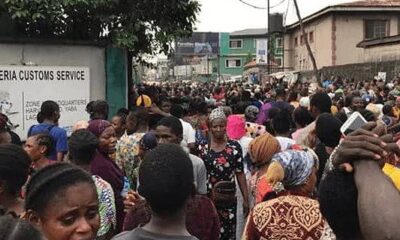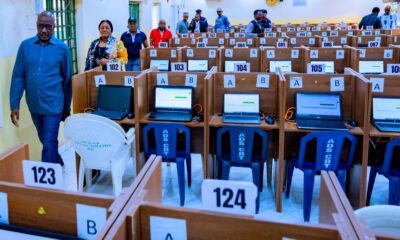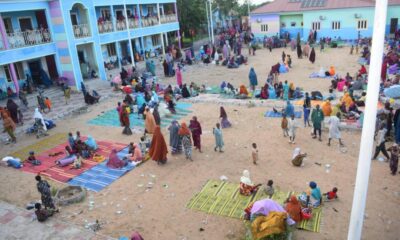Energy
FG Moves To Cushion Effects Of Subsidy Removal, Commissions 5.2 mmscfd CNG Plant In Lagos
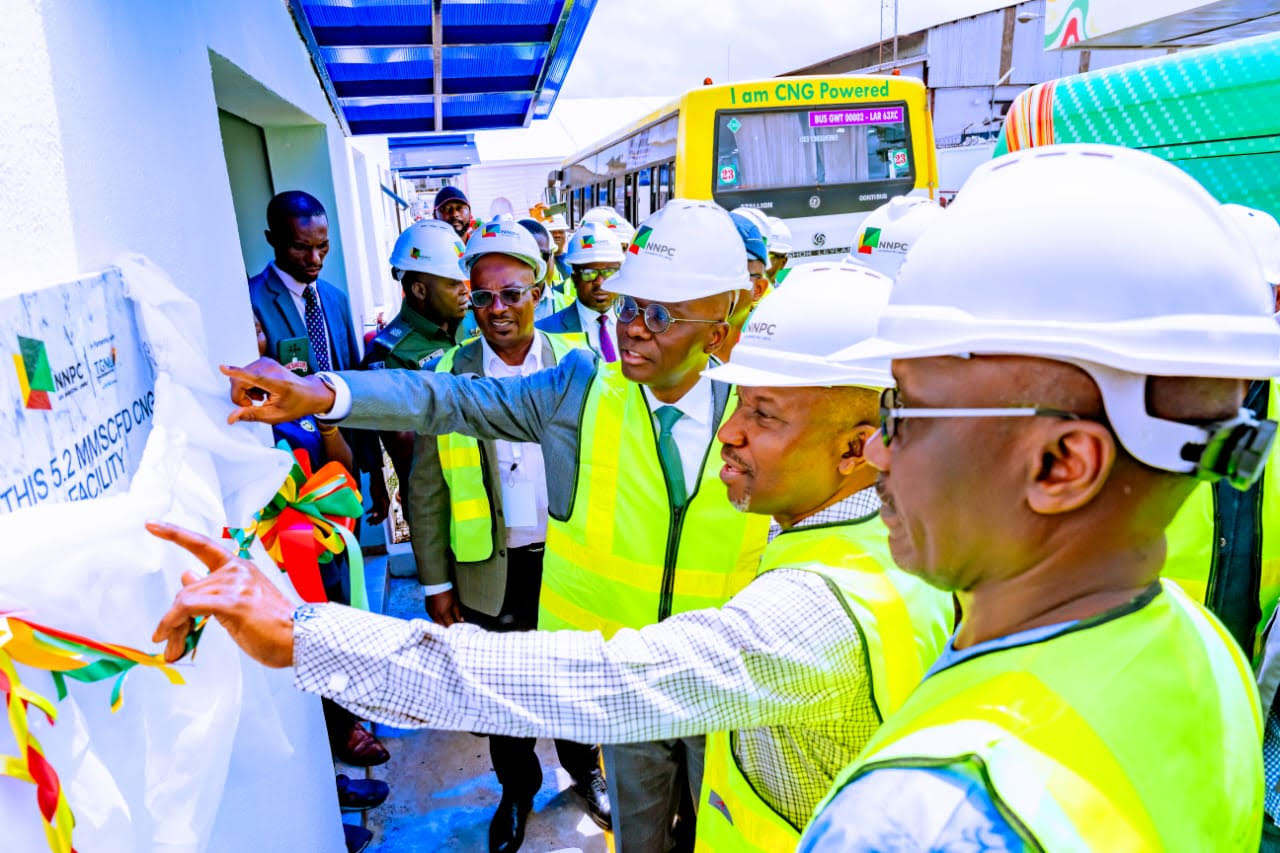
. . . NNPC Plans To Roll Out Six More CNG Stations Nationwide
In its continued efforts to provide alternative source of fuel for Nigerians and lessen the impact of subsidy removal on petrol, the Federal Government has commissioned a 5.2 million standard cubic feet per day (mmscfd) Compressed Natural Gas (CNG) plant in Lagos.
Minister of State for Petroleum Resources (Gas) Rt. Hon. Ekperikpe Ekpo, who commissioned the plant at the Isolo Industrial Area, Ilasamaja in Lagos, on Thursday, said the occasion, under the theme “From Gas to Prosperity: CNG for All”, represents a critical turning point in the development of affordable, sustainable, and secure energy sources in the country.
The Minister described 2024 as a historic year for Nigerians, stressing that through his courageous decision to eliminate fuel subsidies and promote the acceptability and broader use of LPG, President Bola Tinubu has brought about several fresh beginnings in the lives of Nigerians.
“Although the elimination of the Premium Motor Spirit (PMS) subsidy has brought difficulties, it has also given us a once-in-a-lifetime chance to invent and adopt more economical, efficient, and sustainable energy alternatives,” the Minister stated.
Ekpo noted that the use of CNG as a transport fuel is a mature technology used globally as it is the cleanest burning fuel in terms of Nitro-oxide and soot emissions. While it can be employed to power passenger cars and city buses, CNG passenger vehicles emit 5-10% less CO2 than comparable gasoline powered passenger vehicles, the Minister added.
Earlier in his remarks, the GCEO NNPC Limited, Mallam Mele Kyari said to maintain energy security and provide more access to CNG by the Nigerian populace, NNPC has reached a Final Investment Decision (FID) with Axxela Limited to deliver Six CNG mother and service stations plants and stations of 5.2mmscfd capacity each, in selected locations spread across the six geopolitical zones including the FCT to ease access to bulk CNG.
He stated that the move was in addition to NNPC Retail’s phased deployment of CNG in over 100 stations across the country as well as other Joint Venture partnerships on CNG.
In particular, Kyari revealed that the commissioning of the NNPC CNG Station in Ilasamaja Lagos was part of NNPC’s efforts to grow domestic gas supply and utilization by deploying gas infrastructure nationwide.
He said the Petroleum Industry Act (PIA) explicitly mandated NNPC to promote domestic gas utilisation, thereby strengthening the company’s resolve to deploy critical gas infrastructure projects across the country.
“NNPC will continue to deliver more strategic projects for the benefit of our country. We shall utilise our gas resources for industrialisation, power generation and economic prosperity for all,” Kyari stated.
In his speech, the Lagos State Governor, Babajide Sanwo-Olu said the establishment of the CNG plant aligns perfectly with his vision for economic development, job creation and industrialisation in the State.
He said in demonstration of its resolve to champion CNG utilisation across Lagos State, the State Government has concluded plans to deploy 2,500 conversion kits and over 2,000 new CNG buses, which will commence operations before the end of the year.
The Ogun State Governor, Dapo Abiodun, represented by the State Commissioner of Environment, Mr. Ola Oresanya said the State is supporting capacity building in CNG conversion to ensure sustainability and promote economic development within the State and beyond.
In his goodwill message, the Chief Executive, Presidential CNG Initiative, Engineer Michael Oluwagbemi described the plant commissioning as a testament to President Tinubu’s commitment to providing sustainable energy solutions for Nigerians.
The CEO of Axxela, Bolaji Osunsanya thanked all the stakeholders especially the NNPC for its consistent vision towards the delivery of the plant, stressing that his company’s many years of preparation have now met a golden opportunity to deliver cleaner, cheaper energy to Nigerians.
The NNPC CNG Station Ilasamaja is a 5.2MMscf per day capacity station that can serve vehicles and also supply gas to industries and other companies. The Facility has dispensing points for filling cars, buses, trucks and tricycles, utilizing CNG and can fill about 3,700 cars or 600 trucks/buses every day thereby providing a constant supply of CNG.
The state-of- the art CNG plant was built through a partnership between NNPC Gas Marketing Limited (NGML) and Transit Gas Nigeria Limited (An Axxela Company).
Energy
Dangote Partnership: MRS Urges Nigerians To Insist On N935/Litre Petrol Price Nationwide

MRS Oil Nigeria Plc, a prominent player in the Nigerian downstream oil industry, has implemented a new petrol price of N935 per litre across all its retail service stations nationwide.
The company has also called on Nigerians to monitor and report any outlets that fail to adhere to the new price structure.
Biztellers reports that this is consequent upon an announcement by the President of Dangote Industries Limited, Aliko Dangote, that the Dangote Petroleum Refinery has partnered with MRS Oil and Gas to offer petrol at N935 per litre at retail outlets, following a reduction in the ex-depot price from N970 to N899.50 per litre.
ALSO READ: Dangote Slashes PMS Price To N899.50k
It was gathered that MRS Oil Nigeria Plc has instructed all its outlets to implement the new price immediately, setting up a digital platform and monitoring team to ensure full compliance.
In a statement on Monday night, the company declared, “Petrol is now being sold at N935 at MRS Filling Stations nationwide. If you find any station not following this price, please report it. Call 08009447853 or email: NG-FMKPMGWHISTLEBLOWING@NG.KPMG.COM”
Emphasising the eco-friendly nature of its products, MRS Oil added, “We call on all petrol station owners to join MRS Oil Nigeria Plc in improving the supply chain of our beloved country, ensuring product quality and availability in every corner of Nigeria for the benefit of all Nigerians.”
In Lagos, commuters were seen queuing at MRS filling stations to purchase petrol, with many expressing their gratitude to the Dangote Petroleum Refinery and MRS Oil and Gas, urging other marketers to support the indigenous refinery rather than import off-spec products into the country.
A commuter at the MRS station at Alapere on the Lagos Ibadan Express way, Ibukun Phillips, could not hide her joy as her husband filled up their car.
“I am very happy today. This is a victory for Nigeria,” she said. “The price reduction is the best gift of the season. But beyond just the reduction, we are buying standard, eco-friendly petrol at a lower rate. My husband and I have decided we will only be using MRS from now on because we are confident in the quality of the product and supporting the economy.”
A commercial bus driver, Adio Ajibade described the price reduction as a great relief, especially during the festive season.
“The reduction is a great relief. It will reduce transportation costs and benefit Nigerians. God will continue to bless Alhaji Aliko Dangote,” he said.
A public affairs analyst and university lecturer, Dr. Tunde Akanni, said the collaboration between Dangote Petroleum Refinery and MRS Oil represents a significant step towards improving the affordability, quality, and sustainability of petroleum products in Nigeria.
According to Dr. Akanni, “this move will not only help ease the financial burden on Nigerians but also promote a more environmentally conscious approach to fuel consumption, benefitting both the economy and public health in the long term.”
Energy
FDI: Shell To Invest Billions Of Dollars On Nigeria’s Bonga North Oil Field
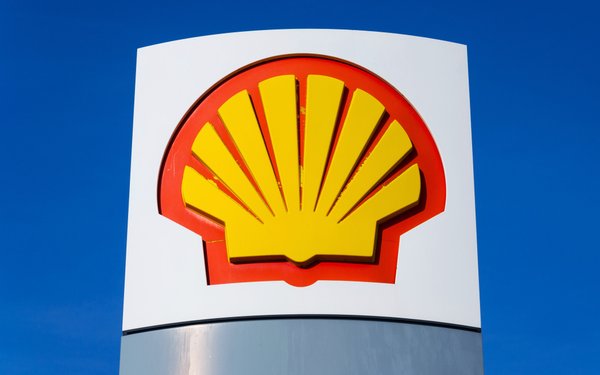
As a direct implication of the Federal Government’s Foreign Direct Investment drive, the Royal Dutch Shell has completed the final investment decision on the deep offshore Bonga North project in Nigeria.
Biztellers reports that the Bonga North will be a subsea tie-back to the Shell-operated Bonga Floating Production Storage and Offloading (FPSO) facility which Shell operates with a 55% interest.
Shell’s Integrated Gas and Upstream Director, Zoë Yujnovich, said, “This is another significant investment, which will help us to maintain stable liquids production from our advantaged Upstream portfolio”.
ALSO READ: OGUNCCIMA Commends Dangote Refinery’s Impact
It was gathered that the Bonga North project involves drilling, completing, and starting up 16 wells (8 production and 8 water injection wells), modifications to the existing Bonga Main FPSO and the installation of new subsea hardware tied back to the FPSO.
The company is optimistic that the project will sustain oil and gas production at the Bonga facility.
The Bonga North currently has an estimated recoverable resource volume of more than 300 million barrels of oil equivalent (boe) and will reach a peak production of 110,000 barrels of oil a day, with first oil anticipated by the end of the decade.
In addition, the Bonga North will help ensure Shell’s leading Integrated Gas and Upstream business continues to drive cash generation into the next decade.
Energy
Chevron Nigeria Bags ‘Energy Company Of The Year For Environmental Sustainability And CSR
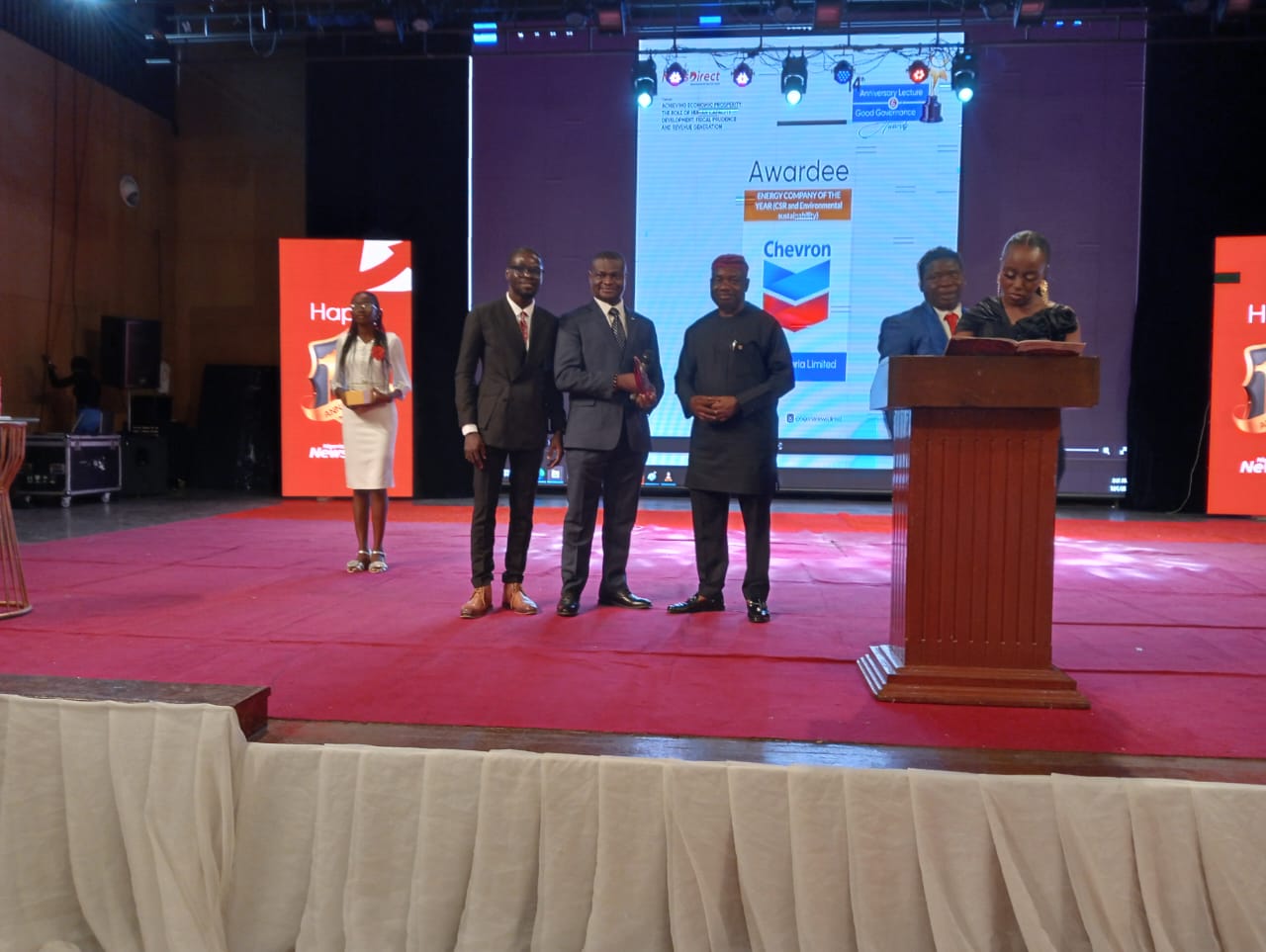
Chevron Nigeria Limited (CNL), has received an award as “Energy company of the year (2024)” for its Environmental Sustainability and Corporate Responsibility accomplishments.
The award presented by the Nigerian News Direct newspaper, on Friday December 6, 2024, and was received by Manager Communications, Chevron Nigeria and Mid-Africa Business Unit, Victor Anyaegbudike, at a colourful event at the Grand Ballroom of the Oriental Hotel, Lagos.
ALSO READ: Stakeholders Hail NCDMB As Local Content Level Hits 56%
The organizers of the award noted that Chevron has implemented the “Protecting People and the Environment” policy, which aims at preventing injuries, illnesses, and environmental incidents. They also referenced that the company has achieved 97% gas flaring reduction in its operations in Nigeria, while implementing waste management and environmental conservation programs.
According to the media organization, Chevron Nigeria has also invested millions of dollars in community development programs, supporting education, health and economic development initiatives that have benefited thousands of people, while ensuring diversity, inclusion, and employee engagement in its business operations.
Receiving the award from the Lagos State Commissioner for Information and Strategy, Gbenga Omotosho, Anyaegbudike thanked the organizers for the honour, and reiterated Chevron’s commitment to continue to develop, affordable, reliable and ever-cleaner energy that enables human progress around the world.

